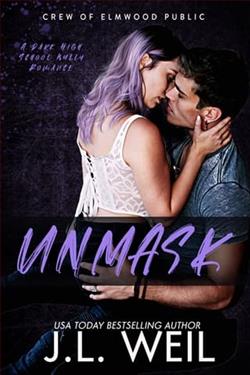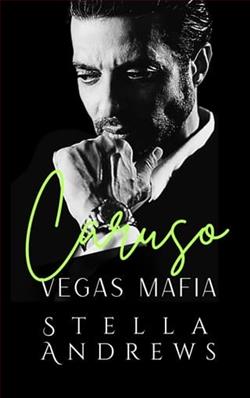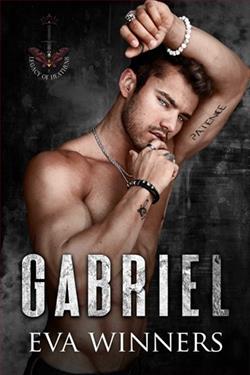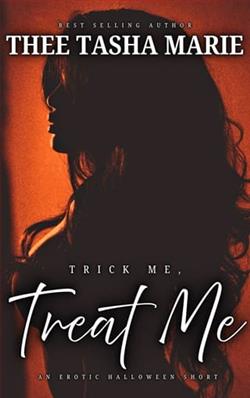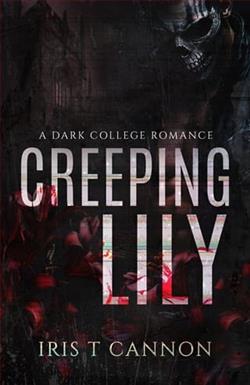Page 39 of Like a Love Story
This doesn’t mean anything, Judy. Don’t make it mean something.
We say goodbye, and then he walks away.
As I descend onto the subway platform, and then onto the train, I can’t stop questioning everything. So what if he wasn’t hard? It’s not evidence that could be admitted into a court of law, or a court of love. If Art were sitting next to me, he’d say it’s nothard evidenceand we’d laugh. Art told me once that the subway was the hottest place in the city, as in sexual heat, not physical temperature. He said that all those bodies rubbing against each other basically made it a clothed, coed bathhouse, not that he’s ever been in a bathhouse. I think he says things like that just to get a rise out of me, but as a crowd of people enters the subway, I can’t help but look at every man’s crotch, trying to assess how easy it is for a man to get hard.
When I enter Uncle Stephen’s apartment, he’s lying on the couch with Art next to him, a box of half-eaten pizza in front of them.Mommie Dearestis playing on the television. It’s almost over. They’re watching the scene where Joan replaces her daughter Christina in a soap opera, literally playing a part meant for a woman half her age. They’re reciting each line at the screen, so loud that you can’t hear the actors, and it sounds like the movie is dubbed.
“How was the date?” Uncle Stephen asks.
“Great,” I say, a little too quickly.
“More detail please,” Uncle Stephen says.
I sit in between them on the couch. “Let’s just watch the movie.”
Art pulls me in so that my head is on his chest. This is so simple, so easy. To rest my head on the chest of a boy I love as a friend, without having to worry about whether and how he loves me back, knowing we’ll be each other’s everything forever because friendship is so much easier than romance. Art’s heart is beating rapidly. On the end table next to the couch is a new picture frame. Inside is a photo of Uncle Stephen, Art, and me from this past Halloween, when we joined the ACT UP protest of Trump Tower, which Uncle Stephen explained to us is a symbol of all the real estate subsidies given to luxury buildings while ten thousand people with AIDS in the city are homeless. The protest was incredible. There was a man dressed as Dorothy holding a sign that read “Surrender, Donald.” There was a man dressed as Freddy Krueger holding a sign that read, “Nightmare on Trump Street.” And us. Uncle Stephen was dressed as Joan Crawford, and Art and I were Christina and Christopher. Art was Christina and I was Christopher. We were a nuclear family. We made sense. We still make sense. I start reciting the lines along with them. And I think how much less complicated things felt before we met Reza, back when we knew the roles we were playing and the script we were reciting.
#115 Taylor, Elizabeth
First she was a doe-eyed child star. Then the most beautiful woman in the world. By twenty-six she was a grieving widow, by twenty-seven a brazen homewrecker, by twenty-eight a near-death survivor, and soon an Oscar winner, and the world’s highest paid actress. She was married seven times (but not to seven men—you do the math), and she became the best friend to none other than Michael Jackson (who seemed unable to befriend anyone who wasn’t a child or a chimp). But her most important role is as afighter. She fights for us. She throws fundraisers, starts foundations, testifies before the Senate. She even stands up to America’s highest-ranking bully and mean girl. The. Fucking. Reagans. Ronald Reagan... hadn’t he already inflicted enough pain upon the world through his abominable acting work? He was even out-acted by a chimpanzee in his most famous role. Now that takes effort. But he one-upped himself by watching aswe died, silently enjoying the genocide like it was dinner theater for him and his equally talentless wife (try sitting through one ofhermovies). It was Elizabeth Taylor who lobbied her old Hollywood pals until he said the word publicly for the first time in 1987. Take that in for a moment. We had been dying in droves for six years, and our president had yet to say the word AIDS. I hope people remember that. And I hope people remember that without her, there would be less glamour in the world, but also less goodness, and less courage.
Reza
Being in JFK airport feels like you’re in every city in the world at the same time. Every language is spoken here, and every kind of person is represented. Families, couples, students, all coming and going. I stare up at the list of arriving flights and imagine myself flying to all these cities, disappearing into Paris for a week, or Rome, or Hong Kong. What would my life be like in Buenos Aires? Who would I be there? My mom sometimes watches that television show that takes place in a bar, and sings along to the theme song, which is about how nice it would be to go to a place where everybody knows your name. But what I’m thinking as I look at these cities is how I would love to go to a place where nobody knows my name, where nobody expects anything of me. Who would I be in Lisbon? Or San Francisco? I would have no mother there, no stepfather, no one to disappoint. I could even die without hurting anybody but myself.
“Where is she?” my mother says, exasperated. Her exasperation belongs to my sister, and her expectations belong to me.
“I don’t know,” I say, searching the crowd of arriving passengers for her. An old woman in a wheelchair being pushed by a flight attendant emerges to the arms of a family holding a banner that reads “Welcome to America, Grandma!” A beautiful woman coolly approaches an older man and gives him a peck on the cheek before throwing her carry-on bag into his arms. A men’s soccer team wearing matching maroon jerseys and shorts comes through the arrival door, talking over each other loudly in Spanish. I don’t know what they are saying, but I don’t care when they have legs like these. If I go to a place where nobody knows my name, I want it to be the place these men are from.
“Zabber!” She screams her nickname for me. “There you are.”
I turn my attention away from those soccer players’ bodies and see my sister. She doesn’t come through the arrivals door. She stands by the entrance near the street. She wears ripped acid-wash jeans with a pink heart sewn into them, a body-hugging black sweater, and a bomber jacket. Her lipstick is ruby red, her nails are hot pink, and her hair is crimped and piled atop her head in a messy bun. She holds a small suitcase.
“Tara!” I scream back, and without looking over at my mother, I rush into my sister’s arms. When she holds me, I melt into her body a little. She feels familiar. Shereminds me of a time when I knew what to expect. But her scent is new. She smells like cigarettes, maybe, and a new perfume.
“Did you not arrive with the other passengers?” my mother asks.
“My flight was overbooked, so I ended up on an earlier flight,” Tara says. “I tried to call and tell you, but no one answered.”
“Oh,” my mother says, suspicious.
“The good news is they gave me credit for the inconvenience, so next time you don’t have to buy me a ticket.” Tara looks at my mom with annoyance. I know what Tara is thinking: that my mother is always suspicious of something. “Or maybe you don’t care about airline credits anymore now that you’re so rich.”
“Tara, please,” my mother says. “Let’s not begin like this. It’s so nice to see you.” My mom takes Tara’s hand and pulls her into a limp hug. They kiss each other on both cheeks, each marking the other with a small smudge of red.
“God, you even smell expensive now, Mom,” Tara says.
Tara has not yet learned the first rule of our new life, which is that we don’t talk about the money we now have. Tara has never been good at rules, whether spoken or unspoken, and it’s like all she wants to talk about as we head home is money. Seeing our life through Tara’s eyes, I understand. When we left Toronto, we were a family that had been living in a cramped apartment and didlaundry once a week because we didn’t have a lot of nice clothes. Now my mother is wearing a Versace blouse, holding a Chanel handbag, and picking her daughter up at the airport in a Mercedes Benz.
Tara notices everything. She notices that our car is spotless and points out that parking a car in Manhattan must cost more than her college tuition. I’m in the back seat as we head into the city, and I can see Tara in the front passenger seat, taking in the city as we enter, the grime and the height and the energy of it. She has the fire this place requires, not me.
“Tara, may we speak frankly before you meet Abbas?” my mother asks as she takes a wrong turn onto Madison Avenue. I realize my mother is purposely extending the car trip to have this conversation.
“You know me, Mother,” Tara says. She calls herMotherwhen she wants to annoy her. “I’m nothing if not honest.”
That’s not true at all. Tara lies all the time. She lies about where she goes, and who she goes with, and what she does when she’s there. But the thing about Tara that’s so fascinating is that she makes you feel like she’s always being honest, because of her confidence and delivery.
“I have not told Abbas about some of your past mistakes because I don’t want him to judge you on your past... ,” my mom begins, and I know that this conversation will go very, very badly.










